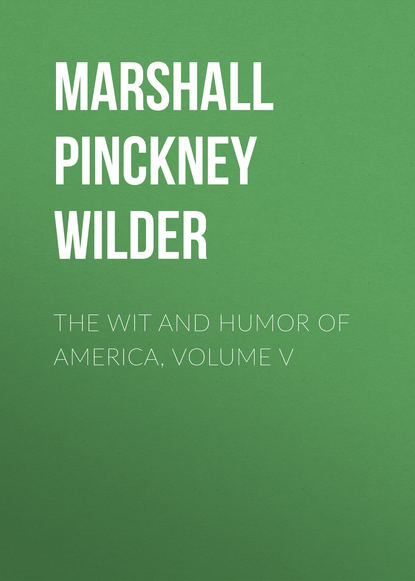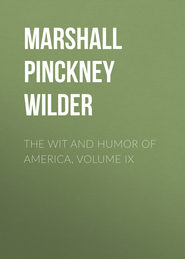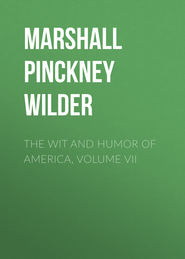По всем вопросам обращайтесь на: info@litportal.ru
(©) 2003-2024.
✖
The Wit and Humor of America, Volume V
Автор
Год написания книги
2019
Настройки чтения
Размер шрифта
Высота строк
Поля
"Shut up!" commanded Dan. "Ye don't know what ye're talkin' about. A sthrike's wan thing an' disordherly conduct's another."
"This was a strike," insisted Danny.
"Where's the union?" demanded Dan.
"I'm it," replied Danny. "I was organizin' it."
"If ye'll let him go, Captain," said Dan, ignoring his son's reply, "I'll larrup him good."
"For what?" wailed Danny. "I was only doin' what you said was right, an' what mom said was right, an' what you've all been talkin' for years. You've been a picket yourself, an' I've heard you laughin' over the way men who wouldn't strike was done up. We got to organize. Wasn't I organizin'? We got to enforce our rights. Wasn't I enforcin' them? We got to discourage traitors to the cause of labor. Wasn't I discouragin' them? Didn't the union tie up a plant once when you was discharged? What's eatin' you, dad?"
Danny's own presentation of the case was so strong that it gave him courage. But the last question made Dan jump, although he was not accustomed to any extraordinary show of respect from his son.
"The lad has no sinse," he announced, "but I'll larrup him plenty. Ye get an exthry wan f'r that, Danny. I'll tache ye that ye're not runnin' things."
"Makin' throuble f'r father an' mother an' th' good man that's payin' ye wages we need at home," added Mrs. Burke.
"Now, what do you think of that?" whimpered Danny, as he was led away. "I'm to be licked fer doin' what he does. Why don't he teach himself the same, an' stop others from doin' what he talks?"
"Danny," said the commiserating captain, "you're to be licked for learning your lesson too well, and that's the truth."
But that did not make the situation any the less painful for Danny.
SIMON STARTS IN THE WORLD
By J.J. Hooper
Until Simon entered his seventeenth year he lived with his father, an old "hard-shell" Baptist preacher, who, though very pious and remarkably austere, was very avaricious. The old man reared his boy—or endeavored to do so—according to the strictest requisitions of the moral law. But he lived, at the time to which we refer, in Middle Georgia, which was then newly settled; and Simon, whose wits were always too sharp for his father's, contrived to contract all the coarse vices incident to such a region. He stole his mother's roosters to fight them at Bob Smith's grocery, and his father's plow-horses to enter them in "quarter" matches at the same place. He pitched dollars with Bob Smith himself, and could "beat him into doll rags" whenever it came to a measurement. To crown his accomplishments, Simon was tip-top at the game of "old sledge," which was the fashionable game of that era, and was early initiated in the mysteries of "stocking the papers." The vicious habits of Simon were, of course, a sore trouble to his father, Elder Jedediah. He reasoned, he counseled, he remonstrated, and he lashed; but Simon was an incorrigible, irreclaimable devil. One day the simple-minded old man returned rather unexpectedly to the field, where he had left Simon and Ben and a negro boy named Bill at work. Ben was still following his plow, but Simon and Bill were in a fence corner, very earnestly engaged at "seven up." Of course the game was instantly suspended as soon as they spied the old man, sixty or seventy yards off, striding towards them.
It was evidently a "gone case" with Simon and Bill; but our hero determined to make the best of it. Putting the cards into one pocket, he coolly picked up the small coins which constituted the stake, and fobbed them in the other, remarking, "Well, Bill, this game's blocked; we'd as well quit."
"But, Mass Simon," remarked the boy, "half dat money's mine. Ain't you gwine to lemme hab 'em?"
"Oh, never mind the money, Bill; the old man's going to take the bark off both of us; and besides, with the hand I helt when we quit, I should 'a' beat you and won it all, any way."
"Well, but Mass Simon, we nebber finish de game, and de rule—"
"Go to the devil with your rule!" said the impatient Simon. "Don't you see daddy's right down upon us, with an armful of hickories? I tell you, I helt nothin' but trumps, and could 'a' beat the horns off a billy-goat. Don't that satisfy you? Somehow or another, you're d—d hard to please!" About this time a thought struck Simon, and in a low tone—for by this time the Reverend Jedediah was close at hand—he continued, "But may be daddy don't know, right down sure, what we've been doin'. Let's try him with a lie—'twon't hurt, noway: let's tell him we've been playin' mumble-peg."
Bill was perforce compelled to submit to this inequitable adjustment of his claim to a share of the stakes; and of course agreed to swear to the game of mumble-peg. All this was settled, and a pig driven into the ground, slyly and hurriedly, between Simon's legs as he sat on the ground, just as the old man reached the spot. He carried under his left arm several neatly-trimmed sprouts of formidable length, while in his left hand he held one which he was intently engaged in divesting of its superfluous twigs.
"Soho, youngsters!—you in the fence corner, and the crap in the grass. What saith the Scriptur', Simon? 'Go to the ant, thou sluggard,' and so forth and so on. What in the round creation of the yearth have you and that nigger been a-doin'?"
Bill shook with fear, but Simon was cool as a cucumber, and answered his father to the effect that they had been wasting a little time in the game of mumble-peg.
"Mumble-peg! mumble-peg!" repeated old Mr. Suggs. "What's that?"
Simon explained the process of rooting for the peg: how the operator got upon his knees, keeping his arms stiff by his sides, leaned forward, and extracted the peg with his teeth.
"So you git upon your knees, do you, to pull up that nasty little stick! You'd better git upon 'em to ask mercy for your sinful souls and for a dyin' world. But let's see one o' you git the peg up now."
The first impulse of our hero was to volunteer to gratify the curiosity of his worthy sire, but a glance at the old man's countenance changed his "notion," and he remarked that "Bill was a long ways the best hand." Bill, who did not deem Simon's modesty an omen very favorable to himself, was inclined to reciprocate, compliments with his young master; but a gesture of impatience from the old man set him instantly upon his knees, and, bending forward, he essayed to lay hold with his teeth of the peg, which Simon, just at that moment, very wickedly pushed a half inch further down. Just as the breeches and hide of the boy were stretched to the uttermost, old Mr. Suggs brought down his longest hickory, with both hands, upon the precise spot where the tension was greatest. With a loud yell, Bill plunged forward, upsetting Simon, and rolled in the grass, rubbing the castigated part with fearful energy. Simon, though overthrown, was unhurt; and he was mentally complimenting himself upon the sagacity which had prevented his illustrating the game of mumble-peg for the paternal amusement, when his attention was arrested by the old man's stooping to pick up something—what is it?—a card upon which Simon had been sitting, and which, therefore, had not gone with the rest of the pack into his pocket. The simple Mr. Suggs had only a vague idea of the pasteboard abomination called cards; and though he decidedly inclined to the opinion that this was one, he was by no means certain of the fact. Had Simon known this he would certainly have escaped; but he did not. His father, assuming the look of extreme sapiency, which is always worn by the interrogator who does not desire or expect to increase his knowledge by his questions, asked:
"What's this, Simon?"
"The Jack-a-dimunts," promptly responded Simon, who gave up all as lost after this faux pas.
"What was it doin' down thar, Simon, my sonny?" continued Mr. Suggs, in an ironically affectionate tone of voice.
"I had it under my leg, thar to make it on Bill, the first time it come trumps," was the ready reply.
"What's trumps?" asked Mr. Suggs, with a view of arriving at the import of the word.
"Nothin' ain't trumps now," said Simon, who misapprehended his father's meaning, "but clubs was, when you come along and busted up the game."
A part of this answer was Greek to the Reverend Mr. Suggs, but a portion of it was full of meaning. They had, then, most unquestionably, been "throwing" cards, the scoundrels! the "oudacious" little hellions!
"To the 'mulberry' with both on ye, in a hurry," said the old man sternly. But the lads were not disposed to be in a "hurry," for the "mulberry" was the scene of all formal punishment administered during work hours in the field. Simon followed his father, however, but made, as he went along, all manner of "faces" at the old man's back; gesticulated as if he were going to strike him between the shoulders with his fists, and kicking at him so as almost to touch his coat tail with his shoe. In this style they walked on to the mulberry-tree, in whose shade Simon's brother Ben was resting.
It must not be supposed that, during the walk to the place of punishment, Simon's mind was either inactive, or engaged in suggesting the grimaces and contortions wherewith he was pantomimically expressing his irreverent sentiments toward his father. Far from it. The movements of his limbs and features were the mere workings of habit—the self-grinding of the corporeal machine—for which his reasoning half was only remotely responsible. For while Simon's person was thus, on its own account "making game" of old Jed'diah, his wits, in view of the anticipated flogging, were dashing, springing, bounding, darting about, in hot chase of some expedient suitable to the necessities of the case; much after the manner in which puss—when Betty, armed with the broom, and hotly seeking vengeance for pantry robbed or bed defiled, has closed upon her the garret doors and windows—attempts all sorts of impossible exits, to come down at last in the corner, with panting side and glaring eye, exhausted and defenseless. Our unfortunate hero could devise nothing by which he could reasonably expect to escape the heavy blows of his father. Having arrived at this conclusion and the "mulberry" about the same time, he stood with a dogged look, awaiting the issue.
The old man Suggs made no remark to any one while he was sizing up Bill,—a process which, though by no means novel to Simon, seemed to excite in him a sort of painful interest. He watched it closely, as if endeavoring to learn the precise fashion of his father's knot; and when at last Bill was swung up a-tiptoe to a limb, and the whipping commenced, Simon's eye followed every movement of his father's arm; and as each blow descended upon the bare shoulders of his sable friend, his own body writhed and "wriggled" in involuntary sympathy.
"It's the devil, it is," said Simon to himself, "to take such a wallopin' as that. Why, the old man looks like he wants to git to the holler, if he could,—rot his old picter! It's wuth, at the least, fifty cents—je-e-miny, how that hurt!—yes, it's wuth three-quarters of a dollar to take that 'ere lickin'! Wonder if I'm 'predestinated,' as old Jed'diah says, to git the feller to it? Lord, how daddy blows! I do wish to God he'd bust wide open, the durned old deer-face! If 'twa'n't for Ben helpin' him, I b'lieve I'd give the old dog a tussel when it comes to my turn. It couldn't make the thing no wuss, if it didn't make it no better. 'Drot it! what do boys have daddies for anyhow? 'Tain't for nuthin' but jist to beat 'em and work 'em. There's some use in mammies. I kin poke my finger right in the old 'oman's eye, and keep it thar; and if I say it ain't thar, she'll say so, too. I wish she was here to hold daddy off. If 'twa'n't so fur I'd holler for her, anyhow. How she would cling to the old fellow's coat-tail!"
Mr. Jedediah Suggs let down Bill and untied him. Approaching Simon, whose coat was off, "Come, Simon, son," said he, "cross them hands; I'm gwine to correct you."
"It ain't no use, daddy," said Simon.
"Why so, Simon?"
"Jist bekase it ain't. I'm gwine to play cards as long as I live. When I go off to myself, I'm gwine to make my livin' by it. So what's the use of beatin' me about it?"
Old Mr. Suggs groaned, as he was wont to do in the pulpit, at this display of Simon's viciousness.
"Simon," said he, "you're a poor ignunt creetur. You don't know nothin', and you've never been nowhars. If I was to turn you off, you'd starve in a week."
"I wish you'd try me," said Simon, "and jist see. I'd win more money in a week than you can make in a year. There ain't nobody round here kin make seed corn off o' me at cards. I'm rale smart," he added with great emphasis.
"Simon! Simon! you poor unlettered fool. Don't you know that all card-players and chicken-fighters and horse-racers go to hell? You crack-brained creetur, you! And don't you know that them that plays cards always loses their money, and—"
"Who wins it all, then, daddy?" asked Simon.
"Shet your mouth, you imperdent, slack-jawed dog! Your daddy's a-tryin' to give you some good advice, and you a-pickin' up his words that way. I knowed a young man once, when I lived in Ogletharp, as went down to Augusty and sold a hundred dollars' worth of cotton for his daddy, and some o' them gambollers got him to drinkin', and the very first night he was with 'em they got every cent of his money."
"They couldn't get my money in a week," said Simon. "Anybody can git these here green feller's money; them's the sort I'm a-gwine to watch for myself. Here's what kin fix the papers jist about as nice as anybody."
"Well, it's no use to argify about the matter," said old Jed-diah. "What saith the Scriptur'? 'He that begetteth a fool, doeth it to his sorrow.' Hence, Simon, you're a poor, misubble fool,—so cross your hands!"








